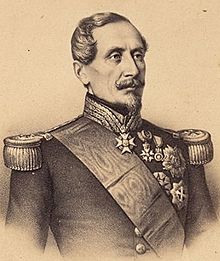Jacques Leroy de Saint Arnaud
| Jacques Leroy de Saint Arnaud | |
|---|---|

19th century lithographic portrait of Saint Arnaud.
|
|
| Born |
20 August 1798 Paris, France |
| Died | 29 September 1854 (aged 56) Black Sea |
| Allegiance |
|
| Service/branch | French Army |
| Years of service | 1821–1854 |
| Rank | Maréchal de France |
| Battles/wars |
Conquest of Algeria Crimean War |
| Awards | Legion of Honour (Grand Croix) |
Armand-Jacques Leroy de Saint-Arnaud (20 August 1798 – 29 September 1854) was a French soldier and Marshal of France. He served as French Minister of War until the Crimean War when he became Commander-in-chief of the army of the East.
Born in Paris, he entered the army in 1817, but after ten years of garrison service he still held only the lowest commissioned grade. He then resigned, led a life of adventure in several lands and returned to the army at the age of thirty as a sub-lieutenant. He took part in the suppression of the Vendée émeute (1832), and served for a time on the staff of General (Marshal) Bugeaud. However, his debts and the scandals of his private life compelled him to go to Algeria as a captain in the French Foreign Legion. There he distinguished himself on numerous occasions, and after twelve years had risen to the rank of maréchal de camp (major general).
In 1848 Saint Arnaud commanded a brigade during the revolution in Paris. On his return to Africa, possibly because Louis Napoleon considered him a suitable military head of a potential coup d'état, an expedition took place into Little Kabylie in northern Algeria, in which Saint Arnaud showed his prowess as a commander-in-chief and provided his superiors with the pretext for bringing him home as a general of division (July 1851).
He succeeded Marshal Magnan as minister of war and superintended the military operations of the coup d'état of 2 December 1851, which placed Louis Napoleon on the throne as Emperor Napoleon III. A year later he became a Marshal of France and a senator, remaining at the head of the war office till 1854, when he set out to command the French forces in the Crimean War, alongside his British colleague Lord Raglan. Ill with stomach cancer, he died on board ship, shortly after commanding at the Battle of the Alma (20 September 1854). His body, returned to France, lies buried in Les Invalides.
...
Wikipedia
